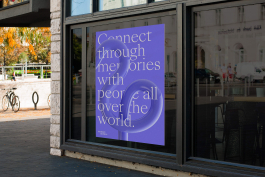
Elena Bauer,
Jule Hägele
Today, libraries are facing many challenges such as digitalisation and changing demands of their services. There is an ongoing debate about their role now and in the future.
Understanding the library as a place offering open and free access to information and ideas, the project Memory Archive poses the question: If it is not information in the form of books that is shared in libraries in the future – what else could it be?
We thus propose a library as a space that stores personal experiences and memories. Memories are not reproducible in the same way as most information. They are connected to a certain time and person and they disappear with their holders dying. In a digital era when it is easier than ever to access books, we found it interesting to explore the idea of storing and sharing something as intangible as memories.
The speculative Memory Archive exists on a digital platform, where people can either search for memories or provide memories. Everyone can be part of this database and be both: a provider of memories and a searcher of memories.
The design concept focuses on the connection between the sharer of a memory and the person requesting it.
An animated 3D spline, inspired by brain structures, serves as a visualisation of this connection. Because the memories can be associated with all kinds of different emotions, the visuals should be a bit ambiguous.
The texture of the spline can vary within a set of fixed parameters in order to show the diversity of the archived memories.
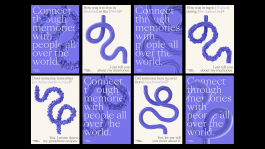
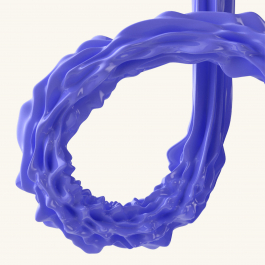

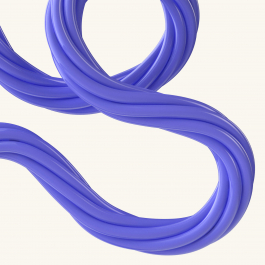
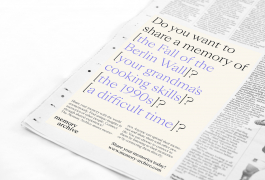
The text layer that includes a changing variable shows that there are all kinds of memories that can be found in the Memory Archive and there is no limit to what these memories can be about.
Elena Bauer,
Jule Hägele
Today, libraries are facing many challenges such as digitalisation and changing demands of their services. There is an ongoing debate about their role now and in the future.
Understanding the library as a place offering open and free access to information and ideas, the project Memory Archive poses the question: If it is not information in the form of books that is shared in libraries in the future – what else could it be?
We thus propose a library as a space that stores personal experiences and memories. Memories are not reproducible in the same way as most information. They are connected to a certain time and person and they disappear with their holders dying. In a digital era when it is easier than ever to access books, we found it interesting to explore the idea of storing and sharing something as intangible as memories.
The speculative Memory Archive exists on a digital platform, where people can either search for memories or provide memories. Everyone can be part of this database and be both: a provider of memories and a searcher of memories.
The design concept focuses on the connection between the sharer of a memory and the person requesting it.
An animated 3D spline, inspired by brain structures, serves as a visualisation of this connection. Because the memories can be associated with all kinds of different emotions, the visuals should be a bit ambiguous.
The texture of the spline can vary within a set of fixed parameters in order to show the diversity of the archived memories.


The text layer that includes a changing variable shows that there are all kinds of memories that can be found in the Memory Archive and there is no limit to what these memories can be about.


